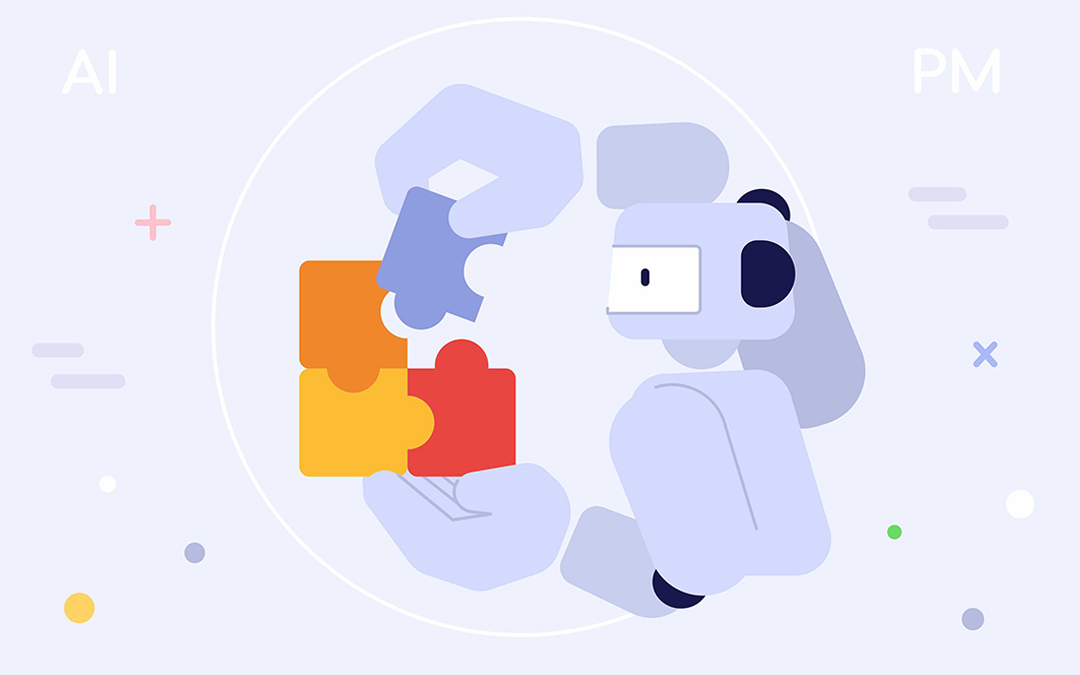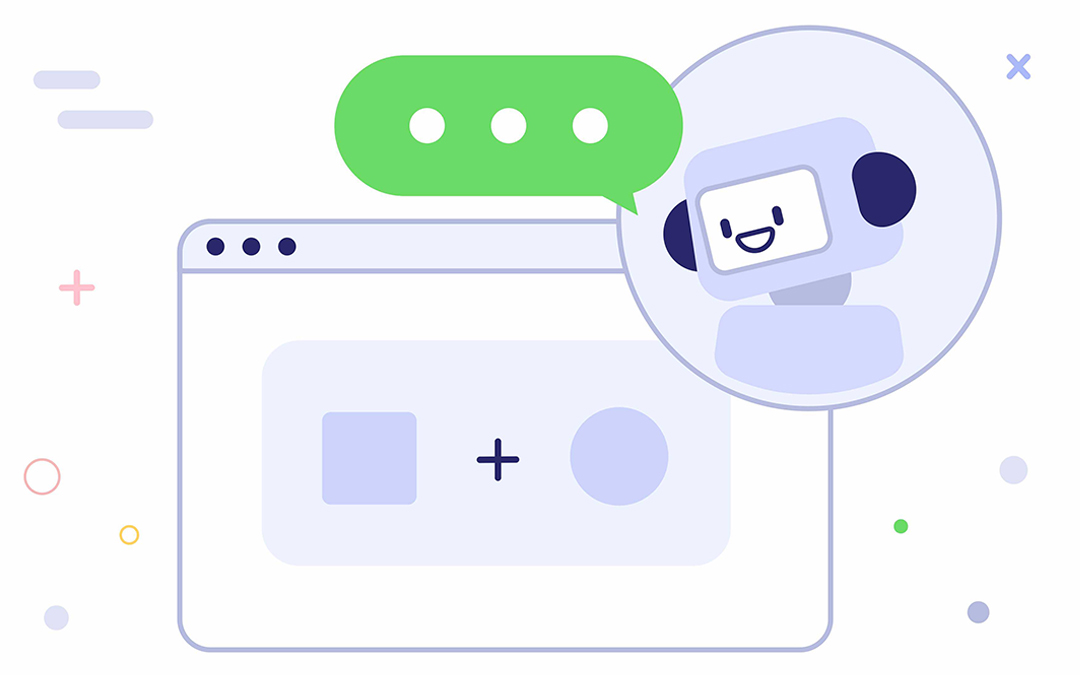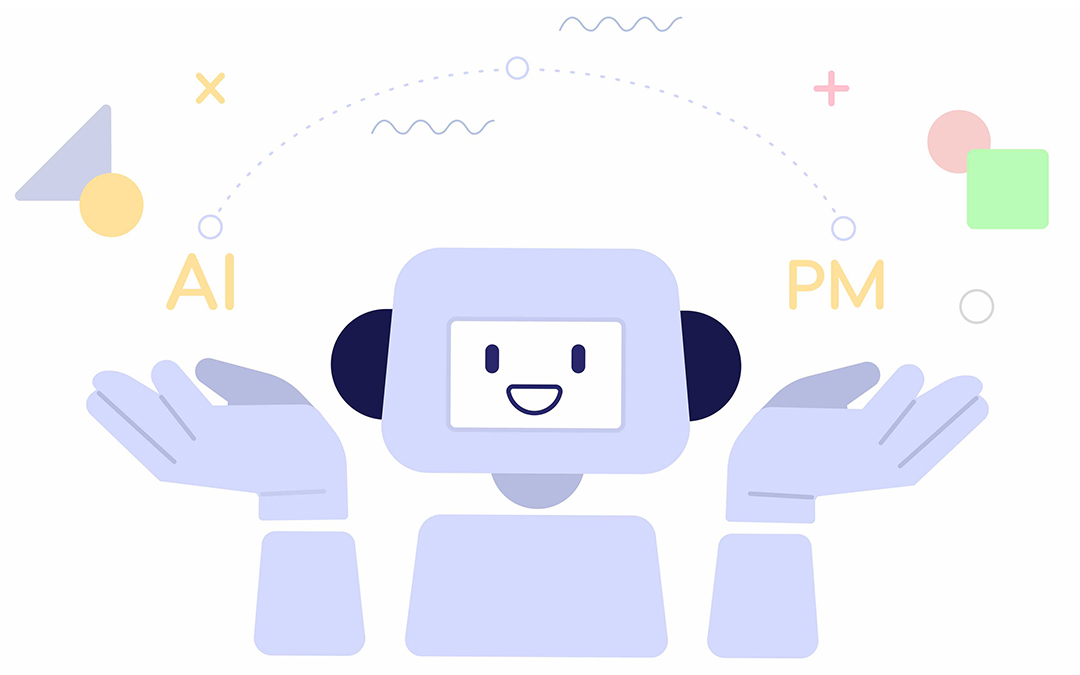According to Gartner, by 2030, 80% of project managers’ tasks will be run by AI, powered by big data, machine learning (ML), and natural language processing. This statement was perceived as a threat to project managers, whose job was supposed to be undertaken by AI-driven project management software. But will project managers be replaced by AI?
AI and Project Management: The True Role of AI in Project and Resource Management Tools
Paul Boudreau, an AI researcher and author of scientific bestsellers about applying artificial intelligence to project management, states that Gartner experts mean something different by this:
“Being able to talk to your email instead of typing or having meetings scheduled automatically are not really project management tasks. Project managers need to embrace AI and lead the change to the way projects are managed.”
In a series of his LinkedIn publications, he answers the question “Will AI replace project managers?” and names three reasons why this won’t happen:
- Managing data: machine learning algorithms won’t provide any results without organized and structured data, which must be prepared by a project manager.
- Interpreting results and taking actions: AI just provides valuable insights and makes suggestions which then should be considered and approved by a project manager.
- Collaborating: an AI-driven tool cannot bring any desired outcomes without the assistance of a project manager. Only fruitful cooperation between AI and an experienced project manager can result in significant improvements in project management.
Therefore, an AI-driven resource management solution doesn’t replace a project or resource manager, it just creates favorable conditions for their productive work and successful delivery of projects. It’s a good assistant that lets companies achieve their goals faster and easier.
Let’s now dive a little deeper into the impact of artificial intelligence on project management.
What are the benefits of leveraging artificial intelligence in project management?
Evidence of the advantages of using AI in project management is numerous. Thus, as stated in KPMG research, companies investing in AI report achieving, on average, 15% productivity improvements for the projects they are undertaking.
According to PMI’s research “AI innovators: Cracking the code on project performance”, AI project management brings the following benefits to companies:
- Better on-time delivery.
The companies that use AI-driven tools report they delivered 61% of their projects on time versus 47% of those who don’t have AI.
- Superior benefits realization.
The companies using AI-driven tools report that 69% of their projects realized 95% or more of their business benefits, compared to 53% of projects for those companies that don’t leverage AI.
- Higher ROI.
The organizations that use AI-driven tools report 64% of their projects met or exceeded their original ROI estimates versus 52% of projects for those companies that don’t utilize AI.
“Project specific tasks include actively managing activities on the critical path, determining the impact of change requests on all areas of the project and minimizing the impact of risk events on the project scope, schedule and budget. These are the areas where AI tools offer the greatest benefit, not in managing a calendar of meetings or automatically creating a status report.” – Paul Boudreau.
The role of AI for project management is especially essential in a changing multi-project environment with a shared resource pool. We explain this by:
- An enormous amount of project-related data;
- Numerous dependencies between projects;
- Lots of variables affecting the environment;
- High level of uncertainty and potential risks.
Small companies that run a couple of projects don’t really need AI unless they have plans to grow their business and start delivering more projects. In this case, an AI-driven solution will be of great assistance, thanks to predictive analytics.
Disruption, Not Automation: How AI Will Transform Project Management
As we’ve puzzled out, the mission of artificial intelligence is not automation of PM processes but significant assistance in managing projects accompanied by lots of variables and uncertainty. As described in an article by Antonio Nieto-Rodriguez and Ricardo Viana Vargas for Harvard Business Review, AI technology will disrupt the following aspects of project management:
- Better selection and prioritization;
- Support for the project management office;
- Improved, faster project definition, planning, and reporting;
- Virtual project assistants;
- Advanced testing systems and software;
- A new role for the project manager.
The authors expect these transformations to come within the decade, but are we really so far from innovation? Let’s take these points as a foundation for the analysis and dwell upon this question through the example of Epicflow, AI-powered resource management software for multi-project environments.
Examples of AI in Project Management: Epicflow as the World’s First AI-Driven Multi-Project Resource Management Software
In his recent book “The Self-Driven Project: Using Artificial Intelligence to Deliver Project Success”, Paul Boudreau states that “Epicflow uses AI to optimize resource utilization across multiple projects in a portfolio”. And this statement perfectly describes our product highlighting the essence of Epicflow as a solution for managing multiple projects: efficient resource utilization based on innovative technology.
Epicflow is the first solution in the market that has successfully implemented AI into its functionality to help businesses deliver multiple projects with a shared resource pool efficiently with an opportunity to grow their business. Machine learning and predictive analytics built into Epicflow’s features, in combination with its unique approach to multi-project resource management, make a ground-breaking contribution to the successful administration of complex multi-project environments.
Better selection and prioritization
AI algorithms can easily figure out which projects will bring the most value to your company based on a thorough analysis of your project data. Machine learning detects patterns and makes predictions that a project manager can’t do manually.
- Epicflow prioritizes tasks and projects based on predictions regarding project outcomes taking into account all project-related data and constraints.
- As a result of enabling the Pipeline leveling functionality applied to the whole portfolio, Epicflow calculates the most optimal sequence of projects and tasks taking relationships between them into account. At that, users can order projects either by priority or business value to gain maximum benefits. The Pipeline leveling feature calculates the dates when all the projects in the portfolio are more likely to be finished based on the estimations and resource availability data.
- Project staggering is another AI-driven feature that lets you deliver your multiple projects on time by postponing the start of some of them. In Epicflow, all AI-driven features work in synergy. As a result of the data analysis (the number of active projects, tasks, priorities, and available resources’ capacity and competence), Epicflow can easily detect a possible bottleneck (that is more likely to happen in the future). As a preventative measure, you can enable project staggering functionality to avoid this bottleneck and ensure smooth workflow.
Support for the project management office
This area of AI-based project management includes
- Better monitoring of project progress;
- The capability to anticipate potential problems and to address some simple ones automatically;
- Automated preparation and distribution of project reports;
- Automation, via virtual assistants, of support functions such as status updates, risk assessment, and stakeholder analysis.
Speaking of Epicflow, it provides the above-mentioned opportunities to its users, and these features have been implemented and successfully functioning for a couple of years already.
- Epicflow provides real-time data about project progress and resource performance so that company management is always informed about the state of things. Moreover, Epicflow is sensitive to any changes and makes recalculations of task and project priorities based on resource availability and other constraints in a real-time mode.
- It controls the workflow in real time and detects bottlenecks before they pose a threat to your projects. As a result, a project and a resource manager always have enough time to analyze the situation and take measures.
- Epicflow’s Future Load graph calculates the resources’ workload and lets management know about potential bottlenecks that may happen in the future providing room for improvements.
- It also facilitates effective risk management and informed decision-making with the help of AI-driven What-if analysis, which is used to test different project environment changes (e.g., reallocating resources, moving milestones, etc.), to analyze its consequences in the future, and to choose the best one for implementation.
- Epicflow’s virtual AI assistant Epica helps keep the project environment consistent by reminding users to make estimates, log their hours, and update data.
- Automatic project report compilation is not the most valuable AI-driven functionality as we’ve already discussed, but still, Epicflow supports advanced reporting opportunities and saves project managers’ time.
Improved, faster project definition, planning, and reporting
- Epicflow bridges resource demand and supply to ensure adequate staffing of all your projects even before their start. This increases the chance of their successful delivery and facilitates stakeholder engagement by making them confident in gaining the desired outcomes.
- With Epicflow’s staggering feature, which we mentioned above, managers can adjust project planning to deliver multiple projects on time by changing the start dates of some of them.
- As we stated above, all features in Epicflow work in synergy, which takes the management of multiple projects to the next level in terms of convenience, simplicity, and efficiency.
Virtual project assistants
There are three layers of analysis and understanding for a virtual project assistant.
- Level 1 – Answering simple queries: once project data is loaded into the system, the technology analyzes and compares the wording in the documents and the request and comes up with the reply;
- Level 2 – Interpreting project logics: an assistant should analyze not only project documents but also the whole environment and understand the logic to come up with the reply to the question a user asks;
- Level 3 – Performing complex analysis based on project logic: this requires machine learning algorithms and a rules-based program with logic. This level is the most complex and there a lot of research and development should be done to make it an ordinary feature of an AI-driven solution.
Epicflow has successfully developed a virtual assistant called Epica. She is capable of performing the functions of the first two levels of complexity described above. It can provide proactive and interactive service to its users.
Proactive assistance
- The virtual assistant informs resources about the need to update a personal or group task status if this negatively affects the project, resource/resource group, or skill load. All team members get a reminder upon their project manager’s request as soon as they go online.
- The virtual assistant warns if a random task has been taken regardless of the established priorities and asks to name the reason.
- The assistant informs that a piece of training is necessary for a resource based on the competence level required for a certain task.
Reactive assistance
Epicflow users can ask the virtual assistant a number of questions (the database is constantly being enhanced), e.g.:
- What is my next task? What should I work on next?
In response, the virtual assistant shows a user his/her Task List with all the tasks ordered according to their priorities.
- May I take a day off?
Epicflow calculates the demand, capacity, and availability in the corresponding resource groups and availability changes. A user gets a positive answer if his/her absence doesn’t do any harm to the projects and a negative reply if his or her absence negatively affects the workflow.
- When may I take a day(s) off?
In response, a user will see the calendar with the dates colored in different colors: from green to red meaning that some days are fine and some days are not a good idea to be absent.
- Knowledge base queries: what does {term} mean?
Users get a definition of the term and/or the link to the Wiki knowledge base with a corresponding article upon their request.
A new role for the project manager
Let’s make this unit a summary of the benefits of artificial intelligence for project managers and project teams, namely the role of AI-driven features of Epicflow. It doesn’t do the work instead of a project or resource manager, it just gives valuable insights for project leaders and helps deliver the desired outcomes out of all projects. When having Epicflow at hand, a project manager gets rid of administrative tasks and gains time for live interaction with project teams and stakeholders, which for sure improves commitment and engagement. This, in turn, cannot but bring positive results to the company running these projects. A project manager becomes a true leader who can put all his/her effort into the improved delivery of numerous benefits and their alignment with the company’s strategic goals.
The feedback of our clients about AI clearly demonstrates its advantage:
“One of the features I like most in Epicflow is the AI-driven What-If Analysis, which gives us the ability to see the future. I can see what will happen if we proceed the way things are happening now. Normally, people who lead projects look at what happened in the past and don’t look at what may block projects in the future. The What-If Analysis provides us with this opportunity so that I may act now and prevent bottlenecks before they appear.”
Speaking of figures and statistics, here are the achievements our clients have achieved with Epicflow:
- The number of projects delivered on time went from 18% to 80%;
- Resource efficiency increased by 21%;
- Lead time decreased by 50%.
- The number of delivered projects increased from 25 to 48 in the first year, to 76 in the second year and to 98 in the third year while the number of engineers went down to 17 (was 22).
- Lead time was reduced to 3-4 months while previously it was 12-18.
- Big projects were dropped into tasks which contributed to the increase in delivery by 200% in 3 years.
Making AI Bring Maximum Results: Necessary Conditions
An AI-driven tool processes project data and transforms it into essential information that a project manager can further use to base his or her decisions on to improve project performance.
At the same time, to make an AI project management solution bring a company maximum benefits, a number of requirements should be met. Let’s consider them below.
There should be access to essential project data
Any informed decision is based on exhaustive project information, which is then gathered and processed by AI algorithms. An AI-driven solution can provide valuable insights into informed decision-making as a result of the analysis of past, present, and future data. But unfortunately, not all project and resource management tools have and give access to it. Thus, as mentioned in the State of Project Management report by Wellingtone, 47% of companies lack access to real-time project KPIs, and there’s no doubt they cannot deliver their projects on time and within budget.
A solution cannot be AI-driven without access to and further processing of past, present, and future data. A truly AI-driven resource management solution is one whose work is based on relevant and accurate data.
Project data should be prepared and managed in a proper way
As we mentioned in our previous research, to make the software solution prioritize tasks, mitigate risks, and provide insights for making informed project decisions, it must have a sufficient amount of data to structure and analyze it, generate patterns, and produce the desired outcome. The biggest challenges here are as follows:
- Team members must timely enter the necessary information.
- They must timely update and edit the data if any changes occur.
- The data must be valid, relevant, and correct.
Though AI-driven software is smart enough to fill in some gaps by making assumptions about the missing data and sending notifications to team members to enter the required information, there are still a lot of challenges these tools can’t address. When working with AI-driven resource management solutions, you should be guided by the rule “garbage in, garbage out”. This means that to receive reliable outcomes, you should input the correct and clear data.
Correct interpretation of the information provided
To make the right project decisions, you have to consider the project-related information about the past (teams’ performance, project outcomes), the present (the actual state of a project environment), and the future (phenomena that affect the final output) provided by the software solution. Implementing a resource management tool won’t change anything if the information it provides isn’t properly analyzed, interpreted, and no conclusions are made. The system transforms the raw data into information and presents it in a user-friendly way (graphs, dashboards, tables), but it’s up to a project/resource manager to make sense of it and draw the right conclusions.
Read more: Why No Miracle Happens: Typical Mistakes in Work with a Resource Management Solution and How to Avoid Them.
Conclusion
There are three main conclusions about the use of artificial intelligence in project management we can make based on our research:
- AI cannot and won’t ever substitute the role of a project manager, but it can significantly assist them in managing multiple projects.
- AI not only simplifies project management but also essentially improves indicators and outcomes that can be delivered by projects.
- Artificial intelligence and project management go hand-in-hand. AI-driven solutions are not something unreal: the future is already here, it’s waiting to be adopted by your company!
Contact us to see an AI-driven multi-project resource management solution in action and find out how Epicflow can help you reach your business goals with less effort and cost.






